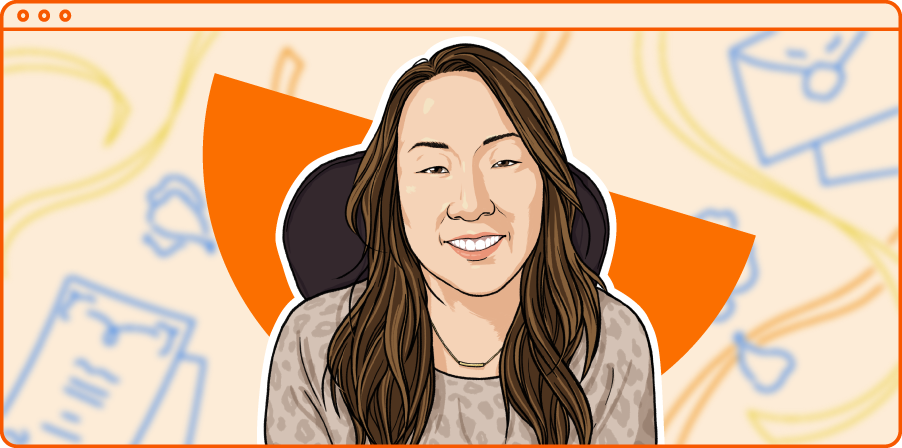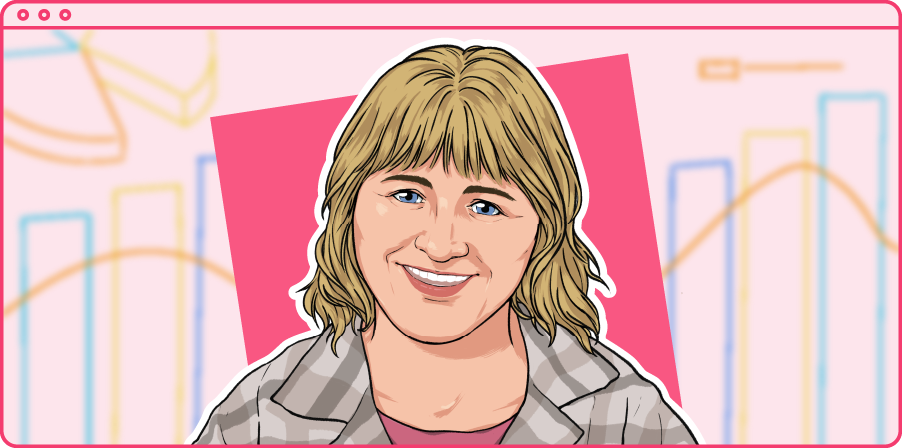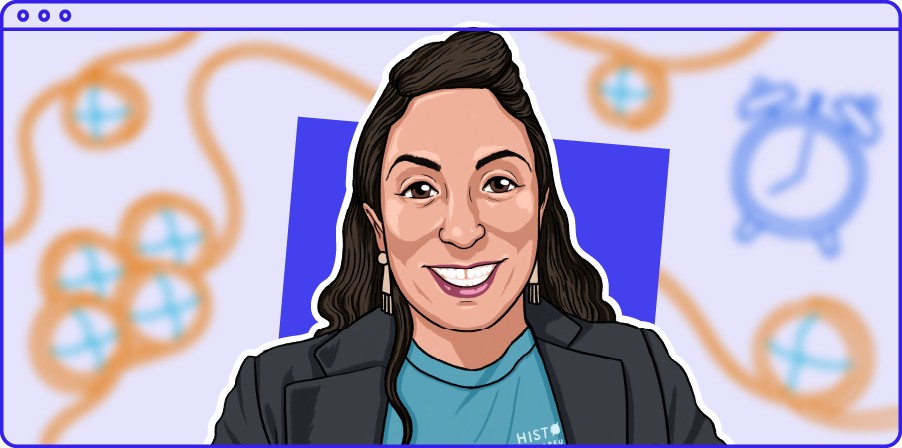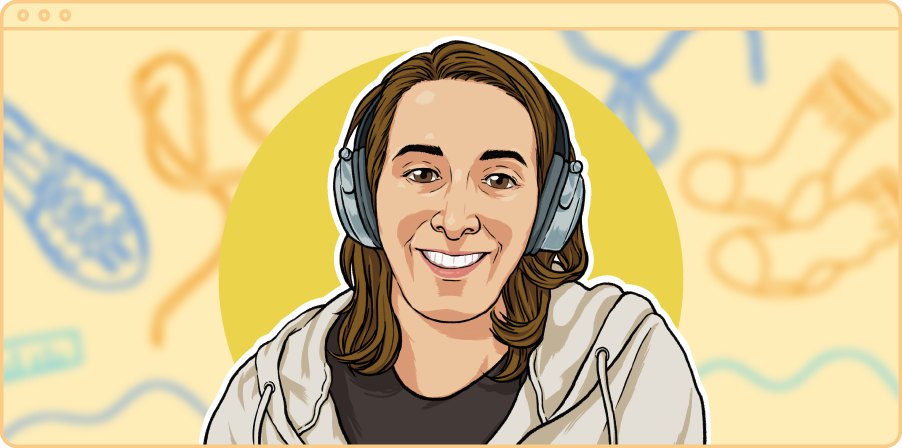Rebecca Chan is the owner and creative director behind Rebecca Chan Events, an event planning and design agency that specializes in corporate events, design-driven activations, and marketing projects. Rebecca’s business is at an inflection point — having spent 15 years establishing a reputation as a leading wedding planner, she has pivoted the business to focus on corporate clients. More recently, she has launched a new home décor line, Maison Botanica.
In this interview, Rebecca talks about the unique model she created to scale her wedding business, the role of PR in building her brand, and how she had to rethink the roles in her company to better serve corporate clients.
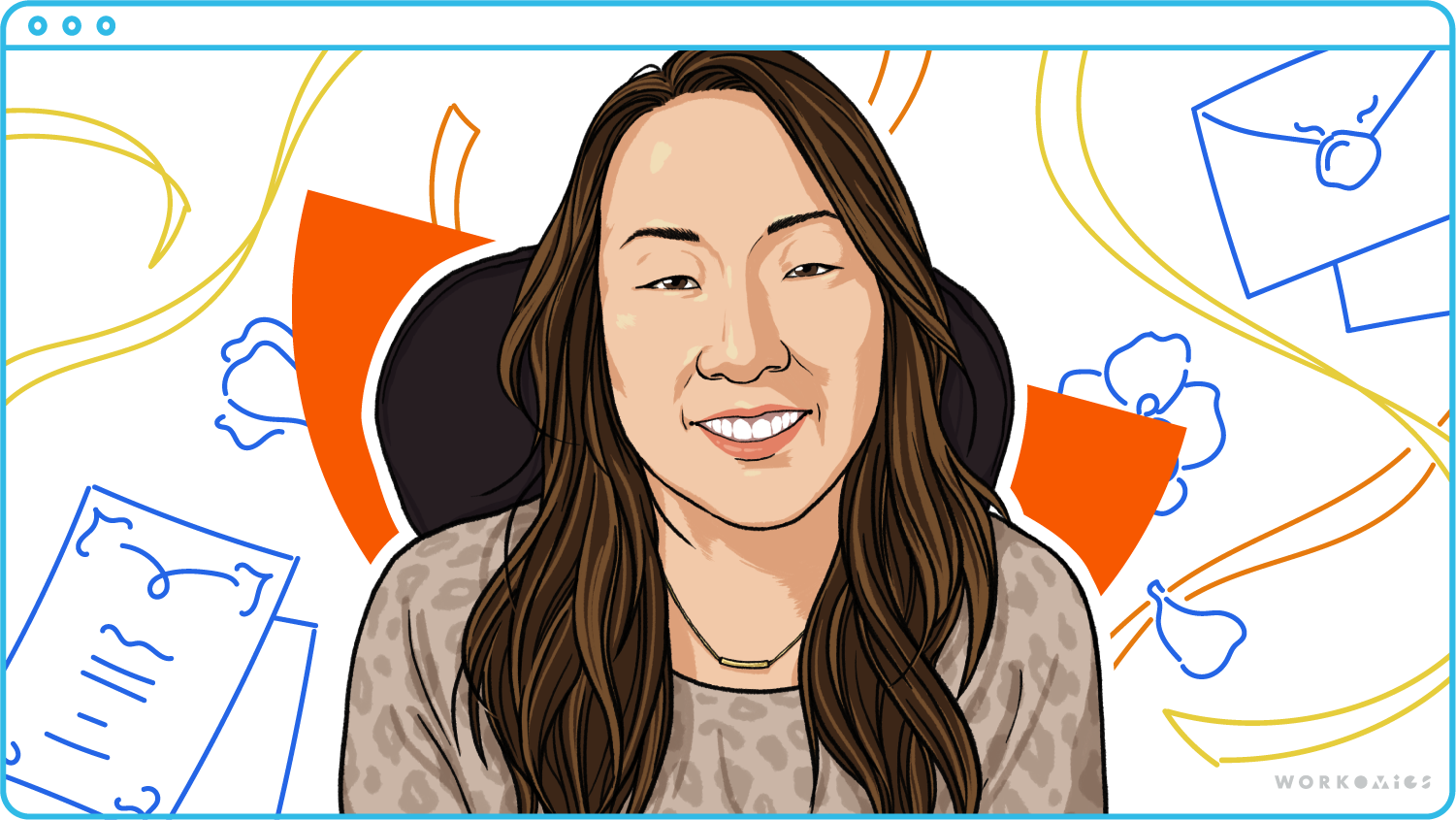
WORKOMICS: Let’s go back to the beginning. You started your company as a side hustle, evolved it into a robust company with multiple employees, and now you’re on your second incarnation. Tell us about the journey.
Rebecca Chan: I studied graphic design in university. Halfway through the program, I realized I didn’t want to pursue graphic design as a full-time career. I did some soul-searching and realized that among my friends and clubs, I’d always been an event planner. So, after I finished my graphic design degree, I took a post-graduate certificate in event design and landed my first job at a non-profit doing special event planning.
Around that same time, all my friends were getting married. They asked the only event planner they knew — me — to help them with their big day. I turned that into a side hustle and soon enough I was planning weddings for all my friends, then friends of friends, and it snowballed from there. Eventually, it got so busy that I quit my day job to focus on the business full time.
In recent years, we started getting corporate clients who had liked our wedding work. One thing led to another and now we’ve pivoted from primarily a wedding planning business to primarily a corporate event business. It’s really been organic growth. I never set out to do events or weddings. The demand came first, and then I took it and ran with it.
WKO: Nonetheless, it must have felt like a leap of faith when you switched from side hustle to full-time company.
RC: I was getting married myself, and looking at my calendar for the next summer, I didn’t know how I was going to survive. I had my 9-to-5 job, 20 weddings booked, and the requests kept coming. I needed to either stop booking more weddings or consider doing it full-time. I sat down with my now-husband and we made a plan. He’s a little bit more risk-averse, so we were having a lot of discussions about what our finances would look like. We crunched the numbers and decided to take the leap after we bought a house. That was ten years ago, and ten years ago, buying a house was a lot easier. But sure enough, we bought a house and the day after we closed, I quit my job.
WKO: You now have a team of four. When you’re small, every new hire is an inflection point. How have you thought about that decision as you’ve grown your team over the years?
RC: One of my planners has been with me from my non-profit days. When I quit that job, I let her know where I was going, and she started out as an assistant and grew with me. A wedding business is primarily consultation-based and very labour-intensive. It’s quite daunting for a lot of wedding planners to think about expanding. Clients are trusting one person to take care of their wedding day. If you bring on people, you have to trust them to take care of your clients. When I got to the point of turning down business, I asked my assistant if she felt ready to take on a wedding day.
I taught her how to do a sales meeting, how to transition from the sales meeting to onboarding the client, how to manage the wedding day itself. She had shadowed me for many years, so she knew my standards. Of course, everyone has a couple of hiccups when they start out, but she worked really well with my clients and with me.
Meanwhile, I learned how to teach someone to do the work, which is a skill I’ve used with other planners over the years. Weddings in Toronto mostly happen between May and October, mostly on Saturdays, and it gets very busy, very quickly. If it was just me doing weddings for my company, it would be 25 weddings at most. With a few people on my team who can also take weddings, I expanded that to fifty or sixty weddings in any given year. We were able to do a lot more by teaching and replicating the process.
WKO: You have rotating assistants in addition to your full-time team. How has that evolved and how do you manage that dynamic?
RC: From the start, I realized that having amazing people on the team was going to be vital to the success of the business and the events I produced. I wanted to make sure that they were paid fairly and that they enjoyed the work. There is an organization that governs the wedding industry in Canada, and they set out guidelines. Their guidelines for bringing on new people is to pay them an hourly fee.
From the get-go, that never sat well with me. A wedding can be many hours of work, with extremely difficult situations that need to be dealt with. It’s a lot of pressure. I didn’t feel right asking someone to get paid $20 per hour to do that work for me, and I needed someone who was more skilled than a $20/hour worker. I have to trust them to do the work, even if I am not there. I would always say to my assistants, “Let’s talk about what your expectation is for how much you want to get paid.” At that time, it might have been they wanted a fixed fee of $1,000, and I would work with them to achieve that.
I had a lot of conversations with my assistants to make sure we were on the same page in terms of expectations for the year. What kind of projects are they interested in? What does their schedule look like? It’s not a 9-to-5 job where you clock in. I’ve had someone who was full-time but also had a side business. She was very forthcoming, and as she started to get busy, her own company took precedence, and that was okay. We’ve had conversations over the years, making sure both sides are happy with how the arrangement is working.
WKO: You fostered a network of entrepreneurs, helping them build capabilities — not in the context of being an employee, but in the context of establishing their own business. And then, having created a new business model for wedding planning that allows it to scale, you said, “We’re going to re-invent the organization and pivot to corporate events.” Talk us through that inflection point and how it came to be.
RC: About five years ago, we had some contacts from the wedding world connect us with some mall properties. The malls wanted someone with a design eye to help them with events. That’s how it starts: you have one or two people take a gamble on you, you do a good job, and they ask you to do it again. Then you share it on social media and other people see it.
We were just dabbling in corporate events until Covid happened. Covid was a nightmare for weddings. Overnight, we had 50 weddings cancelled or rescheduled; it was so hard. For me, the saving grace was the corporate events. I decided to try one year with only corporate events. Over 2022 and 2023, that was very successful. I talked to the team, and they were all in agreement about focusing on corporate events. This year, we’ve been trying to figure out the best route for that — rebranding to let people know what we do now and refining our operations and process.
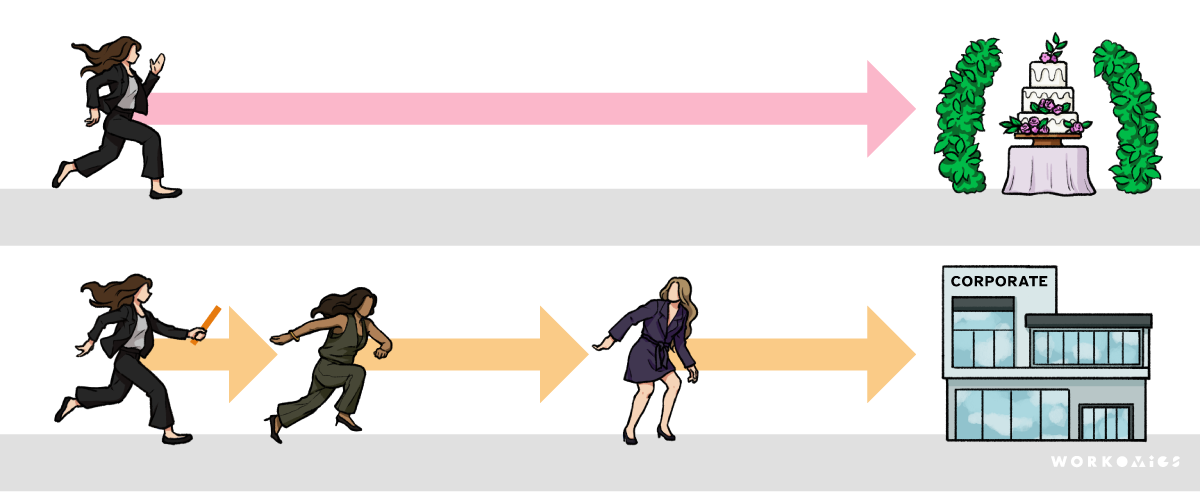
WKO: How did the operations and processes have to change?
RC: When I first started in corporate events, I did it the same way I did weddings — taking the project from beginning to end. That’s all I knew. A wedding is very much a personal relationship, but a business expects that there will be hand-offs to different roles. In our corporate business, I focus on taking clients and approving the initial designs. A graphic designer does all the design from the middle until the end; a lead planner manages the logistics, and coordinators take care of installation. We work together as a team much more now, with everyone having a very set role. I’m not tied up doing 3 am installations when I should be at a computer during office hours planning for the next project.
The other thing that is different with corporate is that you need to have the bandwidth to be creative. If you are go-go-go all the time, you don’t have the time to rest your brain so that you can come up with ideas. With a wedding, people have their own vision, so there wasn’t the same need for my team to think outside the box. Corporate clients are hiring you to come up with the ideas. I didn’t do a single wedding last year and I had so much more creative bandwidth. Suddenly my brain was not occupied by the constant management of a wedding project.
WKO: You have done a lot of media over the years. How did that come about, and what role it will play as your business evolves.
RC: When I was doing weddings I had a little bit of a technological edge over a lot of my competitors, thanks to my graphic design background. I did a lot of the SEO for my website myself, and for many years I ranked number one on Google for a Toronto wedding planner. When the media needed somebody to provide expert advice on a topic, they usually send a mass message to the first few results on Google. It’s always last minute — “The interview is today. Can you help us out?”
I knew that promo and PR were very important to the business. Any time you do an interview, they link back to your website, which is great for Google ranking and SEO. If media asked me for something, I dropped what I had and said yes right away. When the next person sees an article or show you’ve done, they ask too. For a while, I was the Lunar New Year person, doing segments across all kinds of channels.
TV was great for the brand. Do I get direct business from it? Absolutely not. Nobody calls me because they saw me talking on TV. But it elevates you as a leader in the industry, so when someone arrives on the website, they believe you really know what you’re doing.
WKO: What are your reflections on this big transition you’ve been going through? What has surprised you? What have you learned about yourself or your team?
RC: I didn’t realize how much the hustle culture in the wedding industry had taken a toll on my mental health. During Covid, weddings completely stopped. I enjoyed a summer vacation for the first time in my life. I saw my husband more and got back to a lot of my hobbies. I felt refreshed. I’m very thankful for the transition for my own work-life balance.
My husband and I are at a point where we’d like to start planning a family, which might change my priorities or how I run my business. I think the transition to corporate events has been necessary for me to get to that point. Weddings are quite challenging in terms of work-life balance. Corporate clients don’t message me on evenings or weekends, and we have set up the roles so that I’m not hands-on from start-to-finish.
That said, I miss the emotional aspect of wedding planning. You put in so much time with each couple, building a relationship with them, and then you see their dream come true. There’s a fulfilling aspect to being part of a wedding — a kind of high that you get after doing a really great job that really matters to someone. On the corporate side, they’re happy when it’s done, and then they move on to the next project.
Most of all, I discovered I can take on something new, run with it and not look back. In ten years, if something new and exciting comes across my desk, I might pursue it. I see myself as an entrepreneur first, not just an event planner. Even now, I have sparks of things I want to try and see how it goes. I’m considering starting a textile business, and have been working on launching something in the home décor realm.
With any of the shifts in my career, I take it as it comes. Corporate events have found their way to me right now, and I’ve been really enjoying it. Like my business, I am a work in progress.
Our other ideas worth exploring
“I want to hang my hat on me”
Krista Lee Hynes, co-founder and managing partner at Ignite Financial, talks about her journey from theatre to financial planning, and why she has always bet on herself.
A new comfort zone
Shiri Levy, co-founder and Chief Scientific Officer at Histone Therapeutics, talks about building a biotech to bring a genetic medicine to market.
Running shoes designed for women
Lindsay Housman, CEO of Hettas, talks about researching and designing a running shoe specifically for women, along with her philosophy on flexible work, and the challenges of fundraising as a female founder.

